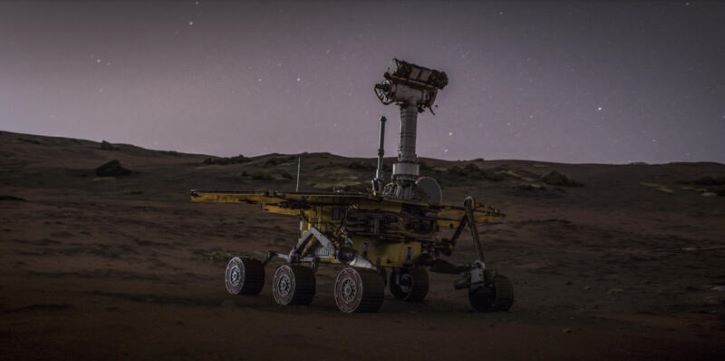![]() Rarely has science been so buoyantly personalized as in Ryan White’s Good Night Oppy, a wondrous journey alongside NASA scientists, engineers, and technicians as they follow the amazing—and extended—lifetime of the Mars rover Opportunity, which surpassed the 90 days it was expected to survive on the planet. All the while, it provided valuable, groundbreaking information during its nearly 15-year-old mission.
Rarely has science been so buoyantly personalized as in Ryan White’s Good Night Oppy, a wondrous journey alongside NASA scientists, engineers, and technicians as they follow the amazing—and extended—lifetime of the Mars rover Opportunity, which surpassed the 90 days it was expected to survive on the planet. All the while, it provided valuable, groundbreaking information during its nearly 15-year-old mission.
After the agency’s best minds meticulously worked on the planning and construction, NASA launched two robot rovers—Opportunity and its twin, Spirit—in 2003. After landing on Mars within a few weeks of each other several months later, the rovers proceeded to send back their unprecedented discoveries while exploring the geology and surface of the red planet.
Spirit worked assiduously for nearly seven years past its three-month shelf life, and the crew in NASA’s Jet Propulsion Laboratory in Southern California were heartbroken when it became immobile and stopped responding to commands. However, Opportunity—or Oppy, as it was affectionately called—kept going… and going. For more than 14 years, Oppy was a tenacious workhorse, sending back valuable pieces of data and analysis. Then, one day, it stopped functioning, receiving a send-off by the scientists that might even make the least sentimental viewer shed a tear for a job well done.
I am generally against reenactments in documentaries—I prefer the Ken Burns approach, which relies on voice-overs, archival footage, and vintage photographs—but that obviously wouldn’t work here. So, in addition to actual mission footage that the rovers sent back, White has visual-effects wizards Industrial Light & Magic create superlative computerized animations that demonstrate how the rovers traverse the Martian surface. The music accompanying these sequences, appropriately soaring in the John Williams mode, is by Blake Neely. Narrator Angela Bassett’s no-nonsense descriptions of the mission as it unfolds is smartly complemented by the NASA scientists involved in the launch and mission. They articulately, amusingly, and even touchingly enliven the uplifting and feel-good tale in their own words.
By throwing in their lot with robots on wheels millions of miles from earth, they have made this mission personal for themselves—and the viewer. When it becomes apparent that Spirit has stopped responding, one of the technicians says, “it did feel like watching a friend go.” When mission control chooses “wake-up songs” to start the rovers’ daily routines, the tunes are chosen with tongue firmly in cheek but also with a sense of how the mission is going at that time. Early on, Steppenwolf’s “Born to Be Wild” is played, and later, Abba’s “SOS” accompanies Spirit near its demise. The Beatles’ “Here Come the Sun” and Wham’s “Wake Me Up Before You Go-Go” are also chosen, while the honor of choosing the final wake-up song is given to Steve Squyres, the spiritual father of the entire mission, who decides on “I’ll Be Seeing You” by Billie Holiday. He chokes up discussing the song and the close of Opportunity’s mission.
After a devastating and destructive sandstorm brings Opportunity’s long streak of survival to an end, Bassett extols “the lucky rover” with the accomplishments of its mission: It received 13,744 command files from mission control during the 5,262 sols (which are Mars days, 40 minutes longer than earth’s) that the rover roamed the red planet. “Good night, Opportunity,” Bassett straightforwardly intones. Then comes an upbeat coda. In June 2020, the latest Mars rover, Perseverance, was launched. It’s still going strong, so here’s hoping that, in another decade or so, we’ll get the inevitable sequel, Good Night Percy.

















Leave A Comment